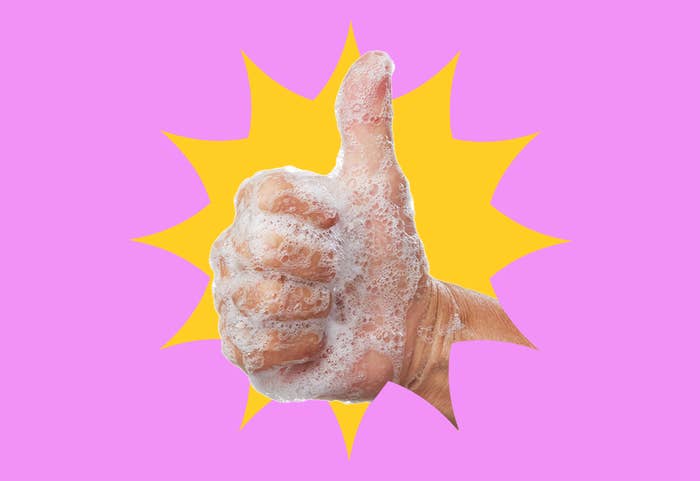
“Did you wash your hands when you were little?” asked Alex Bennett, cohost of Mean Girl, a Barstool Sports podcast about sex, relationships, and adulthood, during an episode released last week.
“I’m sure I did because I was forced … but then I made the conscious decision to stop washing my hands I think when I was in college,” replied Jordyn Woodruff, cohost of the podcast. In fact, she said that between the hours of 10 a.m. and 7 p.m., “there’s no handwashing.” (Although she clarified she cleans her hands after pooping.)
Woodruff admits the social pressure to wash your hands after using the bathroom is so strong, that she occasionally fakes it. “Sometimes with my roommates home, I'll, like, turn the water on because I'm like, I don't want them to think I'm, like, disgusting,” Woodruff said.
Forget the roommates because now a lot of people, including doctors of all kinds, are wincing over the fact that these podcasters are debating whether we should wash our hands in 2023 — three years into an ongoing pandemic that’s still killing 2,000 people every week.
“I don’t really trust people who wash their hands because, well, one, I don't think it does anything to actually wash them,” Bennett said, later adding that “[people] didn't used to wash them way back in the day … and there was less diseases.” She said she doesn’t like to wash her hands because she doesn’t like “being wet”; Woodruff added that Bennett also doesn’t like to shower.
Even a week later, clips of the nearly three-minute discussion have made their rounds on social media, acquiring a host of shocked and grossed-out reactions.
The problem is not that the podcast hosts don’t wash their hands after using the bathroom (which in and of itself is obviously an issue). The bigger concern is that they’re disguising misinformation as trendy honesty and quirkiness. This can give others who think and behave similarly a false sense of assurance that what they’re doing is OK or safe, according to Catherine Zeman, a preventive medicine expert and environmental health professor at James Madison University.
“For somebody to perpetuate a misconception that would in any way contribute to [the myth that handwashing isn’t important], I wouldn't want to be on that side of the issue,” Zeman said. “Pathogens are incredibly small and will establish themselves anywhere they have the basic environment and ability to replicate — and will go about doing that quite quickly. That's the reason you continue to enforce good practices.”
Bennett was right. People often didn’t wash their hands “way back in the day,” but they weren’t better off because of it, not to mention they didn’t know any better. In 1860, life expectancy for people in the US was only 39 years old. In 2020, that number stood at 80 years old due in part to major reductions in infant and child mortality rates from vaccinations, proper sanitation, and other public health measures.
In fact, it was in the mid-1800s when one Hungarian doctor named Ignaz Semmelweis first discovered the importance of washing your hands in healthcare settings — two decades before the germ theory, the idea that microorganisms can cause disease, gained popularity.
Semmelweis was working in a maternity hospital in Vienna that had two clinics, one of which was run by doctors and medical students who began their days performing autopsies on women who died of puerperal fever (or childbed fever). Without washing their hands, the doctors and medical students would move on to the maternity wards where they would perform vaginal exams (this was before gloves were commonly used in hospitals).
The results were deadly. Between 1840 and 1846, the maternal mortality rate in that clinic was 98.4 per 1,000 births. In the second clinic, however, which was run by midwives who didn’t perform autopsies or do routine vaginal exams, the rate was 36.2 per 1,000 births.
After much study, Semmelweis started requiring students to wash their hands with chlorinated lime (referred to as bleaching powder these days) before going into the maternity ward. Maternal mortality dropped to 12.7 per 1,000 births in 1846, comparable to that of the midwives clinic at the time.
The fact that “we are debating foundational science in 2023 … just speaks to our need to redress these issues again and again,” Zeman said.
Handwashing “is the single most important measure to reduce the spread of microorganisms (or germs) from one person to another,” Dr. Sabina Holland, a pediatric infectious disease doctor and professor at the Warren Alpert Medical School of Brown University, told BuzzFeed News.
It’s estimated that inadequate hand hygiene results in nearly 300,000 global deaths annually, the majority of which involve children under 5 years old. According to the CDC, handwashing can prevent about 30% of diarrhea-related illnesses and about 20% of respiratory infections like the common cold and flu. The practice can also help reduce antibiotic resistance (when medications no longer work against certain bacteria) by preventing infections that require them in the first place.
Both Woodruff and Bennett said they felt it was unnecessary to wash your hands after getting up to pee in the middle of the night. Fair, but health experts think otherwise.
“I wholeheartedly recommend washing your hands anytime you use the restroom, no matter what happens in the bathroom! Hand hygiene decreases the risk of transmission of microorganisms that are transmitted via the fecal-oral route (i.e. from your genitals/bottom to your mouth),” Holland wrote in an email. “The time of day does not matter at all.”
Whether you pee or poop, you generally can’t exit the bathroom without touching some surfaces. Bacteria and viruses that cause diarrhea and/or vomiting, such as norovirus, Clostridium difficile (C. diff), E. coli, and salmonella love to wait around the toilet, sink handles, door knobs, and other areas. Other germs like adenovirus and hand-foot-mouth disease can also spread in bathroom settings.
No matter how diligent you are about cleaning your bathroom, flushing the toilet can aerosolize some bacteria, which can land on surfaces. If you touch them and don’t wash your hands, you can spread those germs.
(Fun fact: A single gram of human feces, about the weight of a paper clip, can contain 1 trillion germs.)
“Personally, I would rather effectively wash my hands than experience any of those infections (and I expect my children and partner to do the same),” Holland said.
Both Woodruff and Bennett also admitted to pretending to wash their hands at work by running the sink after using the bathroom.
This reveal spurred strong backlash from another podcaster in the Barstool Sports office, Kelly Keegs, who posted a blog the same day the episode aired saying she doesn’t think “ANYONE needs confirmation that in this cesspool of an office, our chances of acquiring the Bubonic Plague are increasing every day.” (Woodruff and Bennett responded to the “hate” in their following podcast episode and on social media.)
Keegs also acknowledged that she “talked shit about the Plan Bri girls for not washing their hands when they put out an almost identical clip like a YEAR ago, but they get a pass, because at least they know they're trashbags. Re2pect.”
Unfortunately, Woodruff and Bennett aren’t the only ones with the unhealthy habit. A YouGov poll conducted in 2020 of more than 24,000 American adults found that 25% wash their hands with soap “most of the time” after using the bathroom; 10% do so some of the time; and 4% rarely do. Globally, estimates show that only 19% of people wash their hands after using the restroom.
If you need a reminder, here are some handwashing tips from the CDC:
- You should always wash your hands with soap and water for at least 20 seconds, making sure to reach the back of your hands, between your fingers, and under your nails. In the event you don’t have soap, Zeman said rinsing with just water is better than nothing.
- If you don’t have access to a sink, you can use hand sanitizer with at least 60% alcohol, but you have to make sure the sanitizer air dries on its own. Otherwise, it won’t be effective. Note, too, that sanitizer doesn't kill all types of germs such as norovirus.
- Always wash your hands before and after preparing food, eating, caring for sick people, and treating an open wound. Always wash your hands after using the bathroom, changing diapers, blowing your nose, coughing, sneezing, touching or feeding an animal, and touching garbage.
